URIDINE BENEFITS AND EFFECTS


Research in this area is still preliminary, necessitating further detailed clinical trials for confirmation, reported benefits of uridine may include:
- Stimulates neuronal growth, potentially improving learning and memory processes.
- Alleviates symptoms of dry eye syndrome.
- Promotes better sleep quality.
- Offers potential treatment for heart diseases and aids in liver regeneration.
- Positively impacts symptoms of depression and bipolar disorder.
- Reduces nerve pain and accelerates healing of nerve damage.
- Useful in treating lung diseases, including cystic fibrosis, by reducing inflammation and promoting mucus clearance.
- Improves health in HIV-infected patients by helping to prevent side effects of antiretroviral drugs.
Science is the horizon of our knowledge, which is constantly expanding with the discovery of new biological substances and their miraculous roles. One such case is uridine, a component of ribonucleotides that is naturally produced in the human body and is particularly abundant in breast milk. For a long time, it was only part of the structure of RNA, but recent scientific discoveries and studies have attributed to uridine a variety of powers that go beyond a simple genetic role.
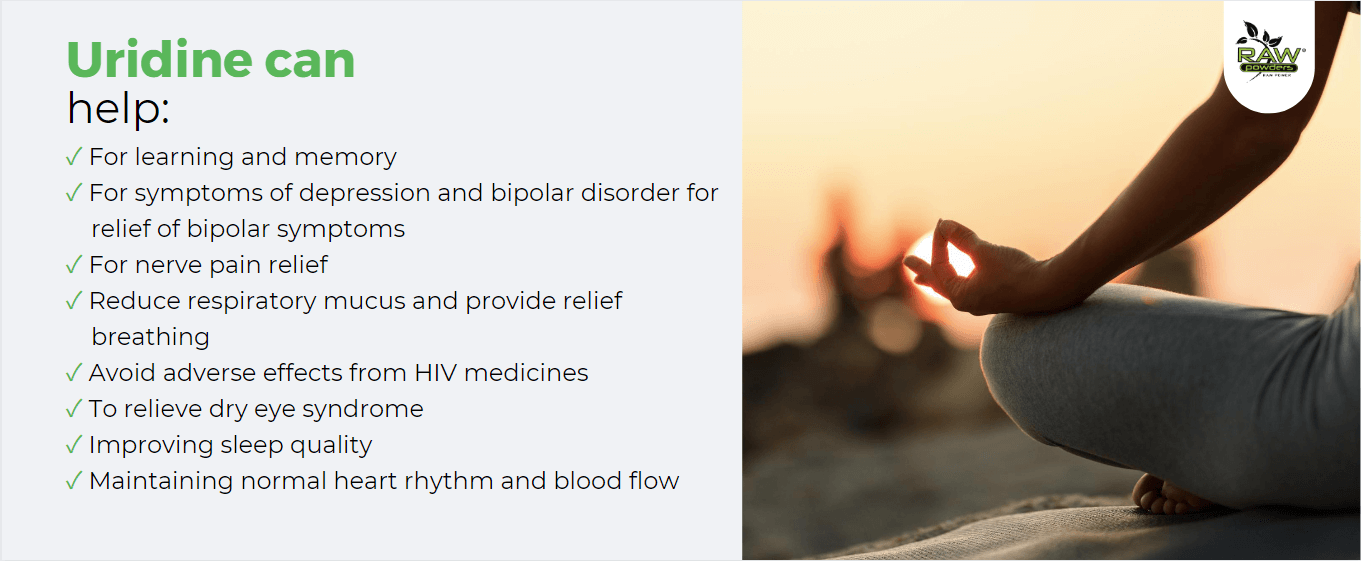
This article discusses the growing scientific interest in uridine, examining its various aspects under research. It delves into the ongoing studies and theories related to uridine, highlighting the interest it has garnered among scientists and healthcare professionals. This piece aims to provide an informative overview of the current scientific exploration surrounding uridine.
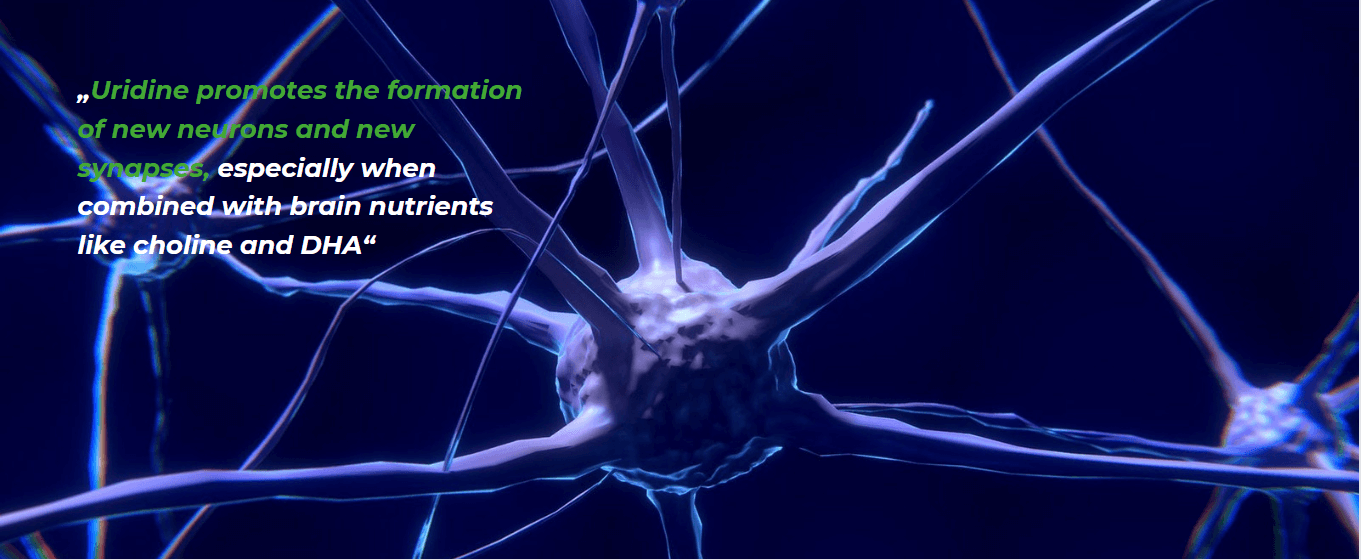
1. Learning and memory
In the brain, uridine is used to produce CDP-choline, a well-known memory enhancer, and other brain phospholipids. The results of a study involving 17 healthy volunteers who underwent brain scans show that uridine supplementation increases their brain levels of phosphoethanolamine (PEtn), an important building block of phospholipids [1].
Uridine creates the right environment for increased neuronal plasticity and synapse formation, which can help the brain adapt, learn, remember and regenerate [2, 3].
In cell and animal studies, uridine has been shown to increase neurite outgrowth, a process that helps brain cells grow and regenerate [2, 3].
In the same studies, uridine also increased the amount of synaptic proteins, small molecules located in the cleft or synapse that brain cells use to communicate. When these proteins are reduced, synapses break down. Only later do the brain cells die and memory problems occur, such as in Alzheimer's disease [2, 3, 4].
Finally, uridine strengthened dendritic spines, the "spines" of neurons where memory is thought to be stored [2, 3, 5].
The findings of the two mouse studies were similar. In one of them, uridine monophosphate combined with choline and DHA improved cognitive function. In the other, uridine and DHA increased the levels of phospholipids and synaptic proteins in the brain [6, 7].
One another animal (maze) study suggests that the administration of uridine for five consecutive days prevents REM sleep deprivation-induced deficits in learning and memory impairment [8].
Uridine activates the P2Y2 receptor, which, together with nerve growth factor (NGF), promotes the birth of new neurons and the regeneration of damaged neurons [9, 10].
It is likely that an active P2Y2 receptor primarily protects neurons from injury. It becomes more active under inflammatory conditions, such as when interleukin-1b (IL-1b) levels are high, to protect the brain [9, 11].
Although promising, most of the studies on the effects of uridine on learning and memory have been in animals and cells. Further clinical studies are needed to confirm these preliminary results.
Uridine promotes the birth of new neurons and the formation of new synapses, especially when combined with brain nutrients such as choline and DHA. Human studies have not yet confirmed these findings, but animal studies are encouraging.
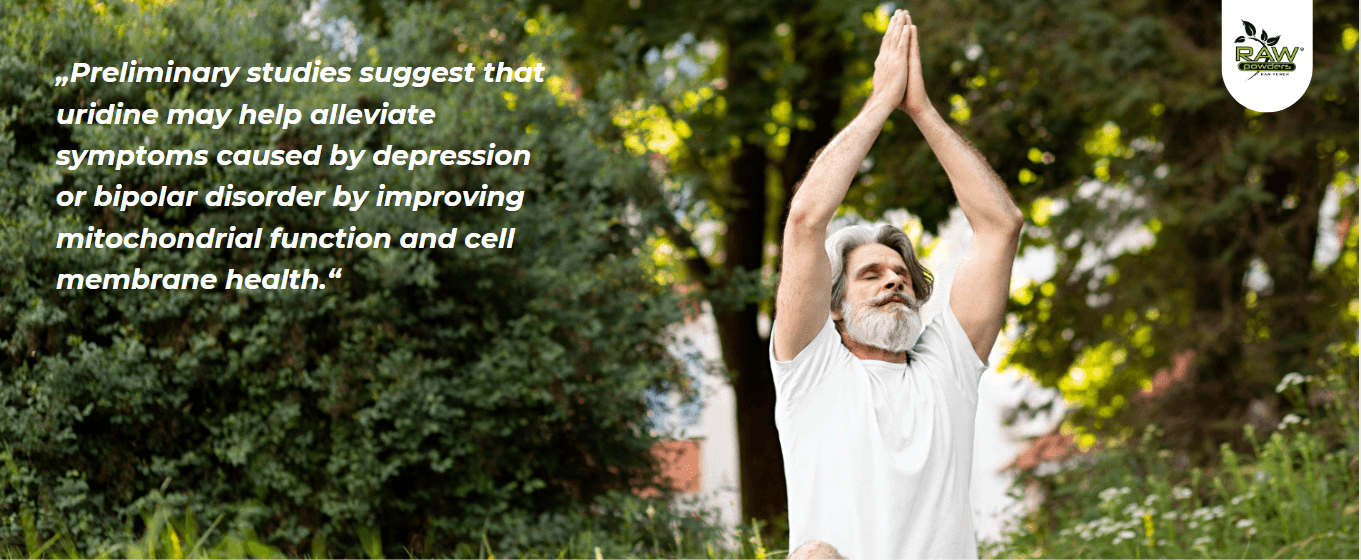
2. Depression and bipolar disorder
In a study of seven adolescents with bipolar disorder, uridine prevented symptoms of depression. It may work by improving mitochondrial function, which is thought to be impaired in the bipolar brain [12].
In a study of 17 healthy people, uridine was shown to improve the phospholipid structure of the nerve cell membrane. Membrane phospholipids may be altered in people with bipolar disorder [13].
In addition, in rats, uridine in combination with omega-3 fatty acids alleviated symptoms of depression [14].
Overall, there is insufficient evidence to support a role for uridine in improving depression. Larger and more robust clinical trials are needed.
Preliminary studies suggest that uridine may help alleviate depression and bipolar disorder by improving mitochondrial function and cell membrane health.
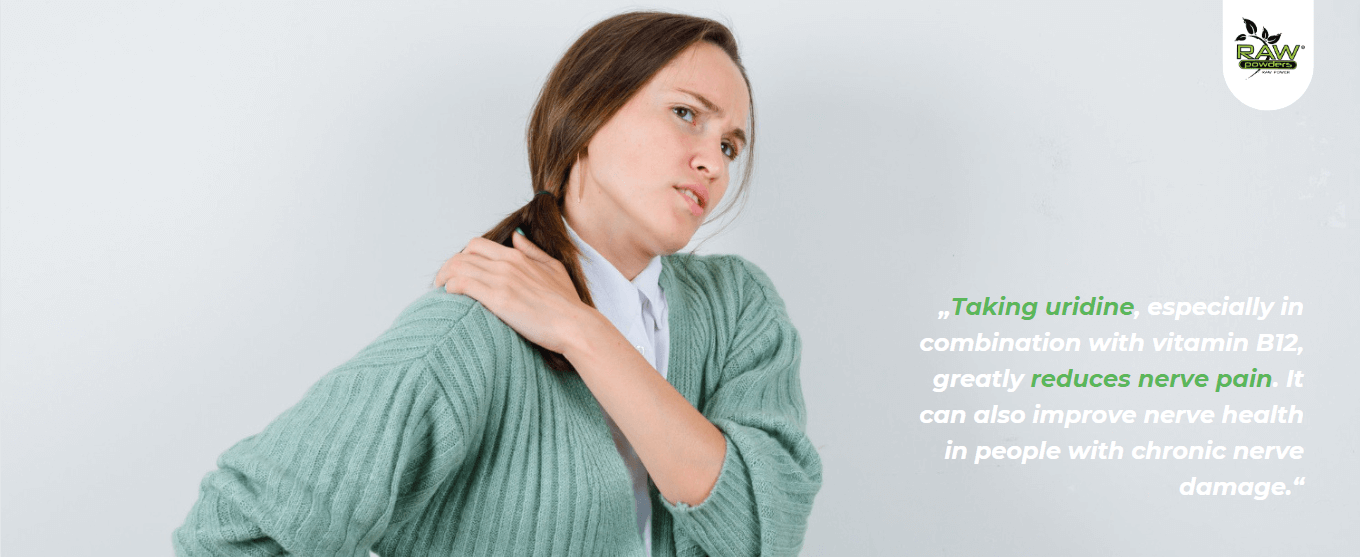
3. Nerve pain and nerve damage
In 212 people with peripheral neuropathy, the combination of uridine, folic acid and vitamin B12 significantly reduced the intensity of pain and the number of damaged areas. This finding is supported by another study involving 48 people with carpal tunnel syndrome: a similar combination reduced pain intensity by around 40% [15].
In a study of 400 people, the combination of vitamin B12, uridine and cytidine was effective in reducing nerve pain with only minor side effects (You can read more about the possible side effects of uridine supplements here). This combination worked better than vitamin B12 alone [16].
Uridine also improved the nerve condition of 20 patients with diabetic neuropathy, a long-term nerve damage caused by high sugar levels in the blood [17].
In another group of human studies, the positive effect of treatment with uridine monophosphate on the dynamics of changes in pain was noted, a dose-dependent effect was revealed: patients receiving higher doses (150-300 mg of uridine monophosphate in combination with choline and a vitamin complex) showed a more significant reduction in pain symptoms compared to those who received lower doses or standard treatments. Additionally, there was a noticeable decrease in the severity of the neuropathic component of pain. [18].
Although the benefits of uridine for nerve pain and damage are promising, the evidence supporting the benefits of uridine comes from only a few clinical trials, most of which were conducted in combination with vitamins. More clinical trials using uridine alone are needed to confirm these results.
Uridine, especially in combination with vitamin B12, can help to reduce nerve pain. It may also improve nerve health in people with chronic nerve damage.
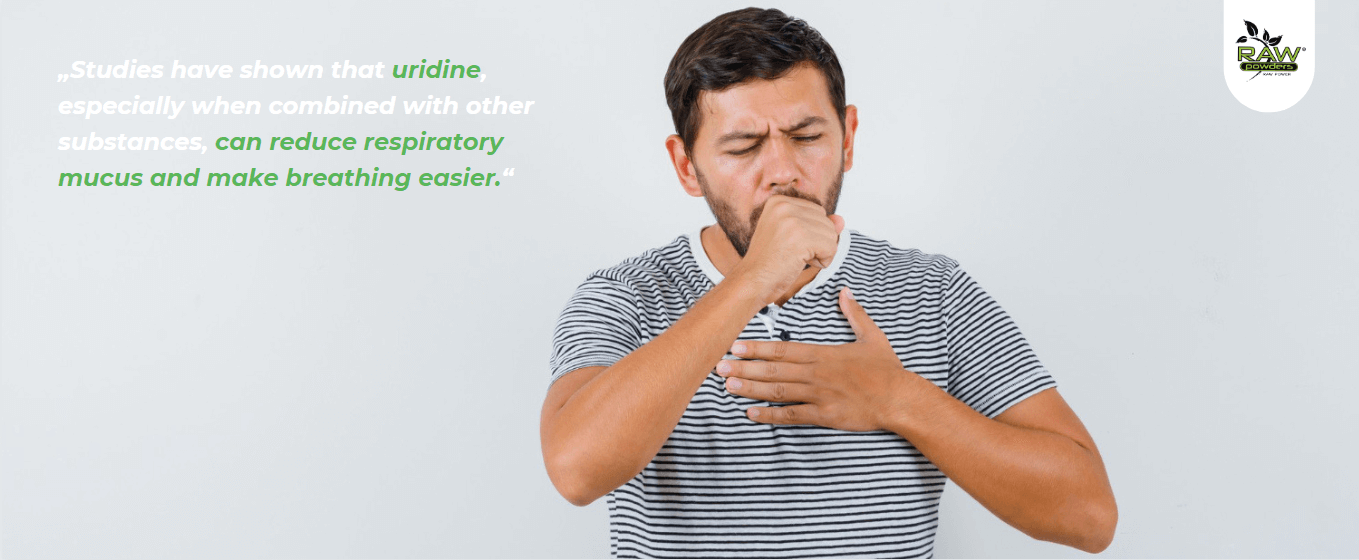
4. Lung disease
Cystic fibrosis is a genetic disorder in which the lungs are damaged and form a layer of sticky, persistent mucus that makes breathing difficult.
In 14 cystic fibrosis patients, uridine triphosphate (UTP) and the drug amiloride improved breathing and cleared mucus; neither UTP nor amiloride alone significantly improved symptoms, whereas their combination almost normalized lung function [19].
Uridine triphosphate in combination with sodium channel blockers relieved the symptoms of cystic fibrosis in mice [20].
In addition, uridine helped clear mucus in healthy human subjects, 15 patients with chronic mild bronchitis and 12 patients with primary ciliary dyskinesia (PCD), a genetic disorder that interferes with the normal clearance of the airways [21, 22, 23].
Uridine reduced inflammation and scar formation in animal and human cells. In mouse lungs, it inhibited the synthesis of collagen and TGF-β, thereby preventing the growth of scar tissue [24].
The results are encouraging, but due to the low number of clinical trials, there is insufficient evidence to support the use of uridine. Further studies in larger populations are needed to confirm their results.
Uridine may reduce respiratory mucus and facilitate breathing. In small clinical trials, symptoms of lung diseases such as cystic fibrosis and bronchitis have improved.
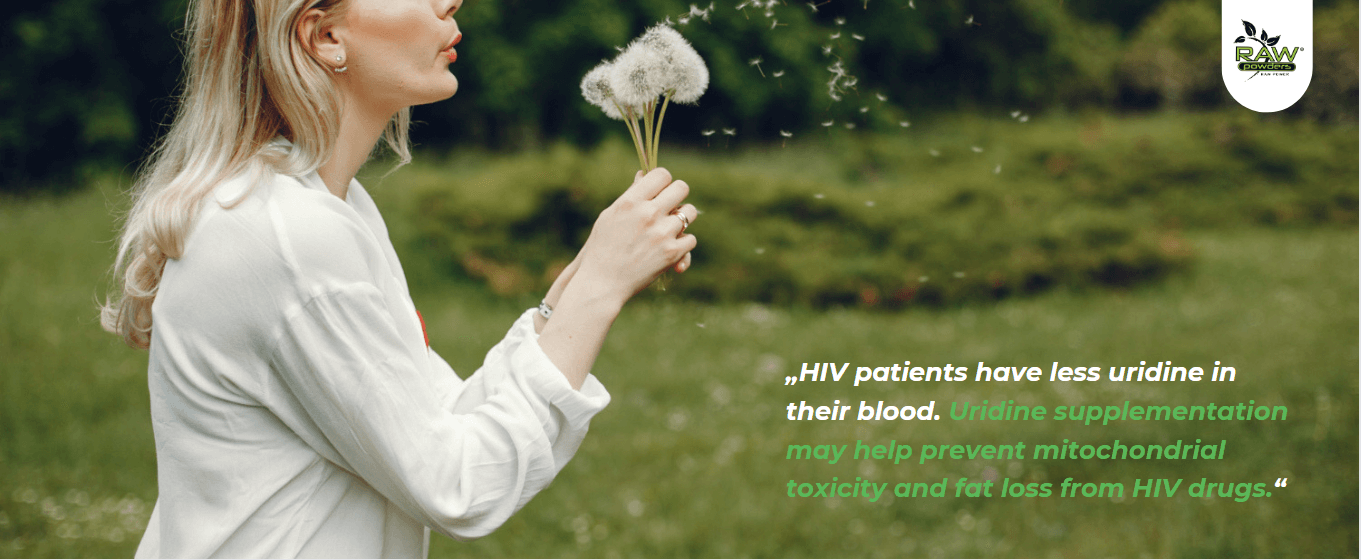
5. HIV-related problems
One study found that HIV-infected patients have lower levels of uridine in their blood than healthy people [25].
HIV-infected patients need to take antiretroviral drugs to control the infection. Over time, these drugs cause an alarming loss of fat in the face, arms, buttocks and legs.
In a study involving 165 HIV-infected patients, those who took uridine supplements for 24 weeks showed an increase in limb fat. However, this effect disappeared after one year. Higher doses may have been needed, or the patients may have been exposed to antiretrovirals for too long. [26].
Long-term antiretroviral treatment has a toxic effect on mitochondria. In one human study, uridine was found to protect against mitochondrial toxicity from antiretrovirals. This finding is supported by several cell studies [27, 28].
Whether uridine is effective in preventing adverse effects of anti-HIV drugs should be confirmed in further clinical trials.
HIV patients have less uridine in their blood. Uridine supplementation may help prevent mitochondrial toxicity and fat loss due to HIV drugs, but more clinical trials are needed.
6. Dry eyes
Dry eye syndrome, which affects up to 20% of adults, results in inadequate natural tear production, leading to inflammation of the ocular surface. In a small study involving 27 people with this syndrome, taking uridine supplements effectively restored tear production [29].
A single clinical study cannot be considered as sufficient evidence to support such use. More studies in larger populations are needed before concluding that uridine helps improve dry eye syndrome.
7. Sleep aid
Uridine is naturally found in breast milk. In a study involving 30 infants with sleep disturbances, sleep quality improved when they were fed uridine-5′-phosphate, tryptophan and adenosine-5′-phosphate fortified cereals. Infants who ate these uridine-enriched cereals at bedtime experienced higher sleep quality and were less likely to wake up during the night [30, 31].
Uridine monophosphate (UMP) has also been shown to help improve sleep in adults, but more research is needed to confirm its effectiveness. In rats, uridine promotes slow-wave (deep) sleep, which is the most restorative phase of sleep [32, 33].
Overall, very few studies have been conducted on the use of uridine as a sleep aid. More clinical trials are needed to draw more accurate conclusions.
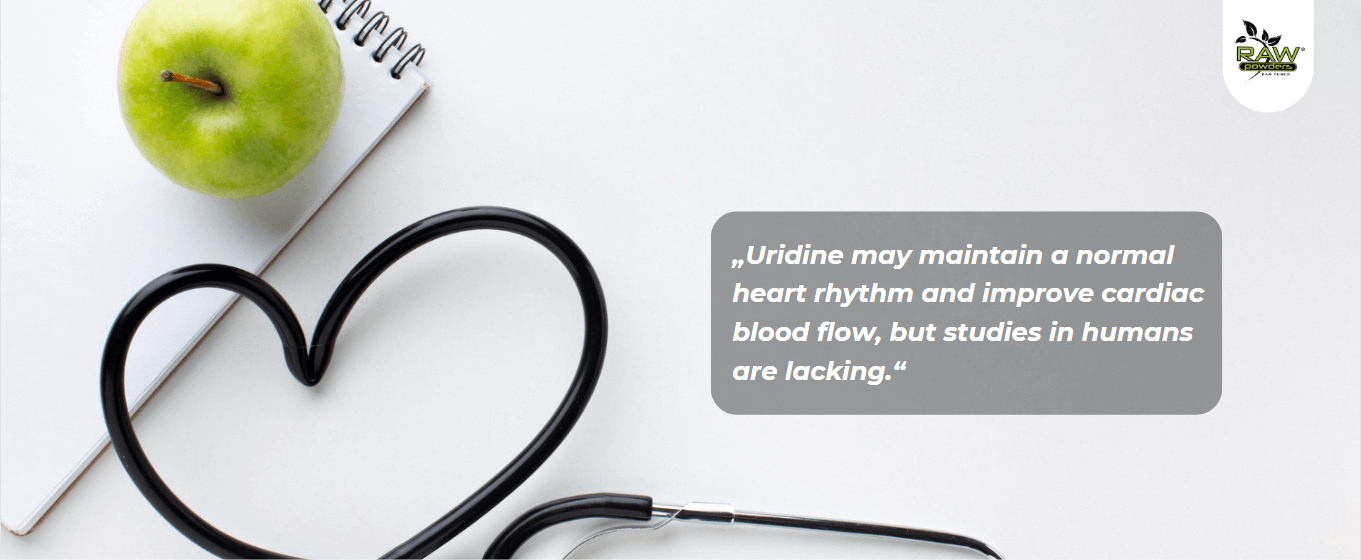
8. Heart disease
Oxygen deficiency can cause heart damage. This occurs when the arteries supplying oxygen to the heart are partially or completely blocked, usually by fatty plaques [34].
In a study in rats, uridine normalized the heart rhythm by activating energy metabolism. The most effective was in the form of uridine-5′-monophosphate (UMP) [35].
Additionally by activating P2Y2 receptors, uridine shows potential to improve heart health. In a combined animal and cell study, P2Y2 receptor activation increased blood flow and improved blood pressure [36].
Uridine may maintain normal heart rhythm and improve cardiac blood flow, but studies in humans are lacking.
9. Liver regeneration
People who receive a liver transplant often have to take immunosuppressive drugs to prevent graft rejection, but these drugs reduce the liver's ability to regenerate. In rats, uridine improved liver regeneration after liver transplantation. It completely restored normal liver growth [37].
However, long-term chronic use of uridine can be harmful. In mice, prolonged administration of uridine worsened liver function and caused insulin resistance [38].
For more information on the use and dosing of uridine in humans, see the blog Uridine dosing and use.
To date, there have been no studies investigating the effects of uridine on human liver health.
Uridine may improve liver regeneration in the short term, but in the long term it may cause liver damage. Its effects on human liver health are still unknown.
Animal and cell studies (lack of evidence)
Research is currently ongoing into additional potential health benefits of uridine. As these studies are conducted in animals and cells, we cannot conclude with certainty that the effects will be the same in humans.
Medical Disclaimer
The information provided in our articles is solely for educational purposes and should not be considered medical advice or instruction. No action or inaction should be taken based solely on the contents of this information. Readers should consult their health care professional on any matter related to their health and well-being. The information and opinions provided here are believed to be accurate and sound, based on the best judgment available to the authors, but readers who fail to consult with appropriate health authorities assume the risk of any injuries. The publisher is not responsible for errors or omissions.
Please be aware that different countries may have specific regulations and that this disclaimer does not replace the need for consultation with a healthcare provider before beginning or changing a treatment or supplement regimen. The information contained in this article is not intended to diagnose, treat, cure, or prevent any disease. Individual results may vary.
References
- Nivedita Agarwal, Young-Hoon Sung, J. Eric Jensen, Grace daCunha, David Harper, David Olson and Perry F. Renshaw. Short-term administration of uridine increases brain membrane phospholipids precursors in healthy adults: a 31-phosphorus magnetic resonance spectroscopy study at 4T. Bipolar Disord. Author manuscript; available in PMC 2011 Dec 1. Published in final edited form as: Bipolar Disord. 2010 Dec; 12(8): 825–833. doi: 10.1111/j.1399-5618.2010.00884.x. PMCID: PMC3020593. NIHMSID: NIHMS254875. PMID: 21176029. https://www.ncbi.nlm.nih.gov/pmc/articles/PMC3020593/
- A. M. Pooler, D. H. Guez, R. Benedictus, R. J. Wurtman. Uridine enhances neurite outgrowth in nerve growth factor-differentiated PC12. Comparative Study Neuroscience, 2005;134(1):207-14. doi: 10.1016/j.neuroscience.2005.03.050. https://pubmed.ncbi.nlm.nih.gov/15939540/
- R. J. Wurtman, M. Cansev, I. H. Ulus. Synapse formation is enhanced by oral administration of uridine and DHA, the circulating precursors of brain phosphatides. Review J Nutr Health Aging. 2009 Mar;13(3):189-97. doi: 10.1007/s12603-009-0056-3. https://pubmed.ncbi.nlm.nih.gov/19262950/
- Alberto Lleó, Raúl Núñez-Llaves, Daniel Alcolea, Cristina Chiva, Daniel Balateu-Paños, Martí Colom-Cadena, Gemma Gomez-Giro, Laia Muñoz, Marta Querol-Vilaseca, Jordi Pegueroles, Lorena Rami, Albert Lladó, José L. Molinuevo, Mikel Tainta, Jordi Clarimón, Tara Spires-Jones, Rafael Blesa, Juan Fortea, Pablo Martínez-Lage, Raquel Sánchez-Valle, Eduard Sabidó, Àlex Bayés, Olivia Belbin. Changes in Synaptic Proteins Precede Neurodegeneration Markers in Preclinical Alzheimer's Disease Cerebrospinal Fluid. Mol Cell Proteomics. 2019 Mar;18(3):546-560. doi: 10.1074/mcp.RA118.001290. Epub 2019 Jan 3. PMID: 30606734 PMCID: PMC6398205. https://pubmed.ncbi.nlm.nih.gov/30606734/
- Maya Frankfurt, Victoria Luine. The evolving role of dendritic spines and memory: interaction(s) with estradiol. Horm Behav. Author manuscript; available in PMC 2016 Aug 1. Published in final edited form as: Horm Behav. 2015 Aug; 74: 28–36. Published online 2015 May 17. doi: 10.1016/j.yhbeh.2015.05.004. PMCID: PMC4573337. NIHMSID: NIHMS692217. PMID: 25993604. https://www.ncbi.nlm.nih.gov/pmc/articles/PMC4573337/
- Richard J. Wurtman, Ismail H. Ulus, Mehmet Cansev, Carol J. Watkins, Lei Wang, George Marzloff. Synaptic proteins and phospholipids are increased in gerbil brain by administering uridine plus docosahexaenoic acid orally. Comparative Study Brain Res. 2006 May 9;1088(1):83-92. doi: 10.1016/j.brainres.2006.03.019. Epub 2006 Apr 21. PMID: 16631143 DOI: 10.1016/j.brainres.2006.03.019. https://pubmed.ncbi.nlm.nih.gov/16631143/
- Sarah Holguin, Joseph Martinez, Camille Chow, Richard Wurtman. Dietary uridine enhances the improvement in learning and memory produced by administering DHA to gerbils. FASEB J: 2008 Nov;22(11):3938-46. doi: 10.1096/fj.08-112425. Epub 2008 Jul 7. PMID: 18606862 PMCID: PMC2574024. https://pubmed.ncbi.nlm.nih.gov/18606862/
- Busra Ocalan, Aysen Cakir, Cansu Koc, Guldal Gulec Suyen, Nevzat Kahveci. Uridine treatment prevents REM sleep deprivation-induced learning and memory impairment. Neurosci Res. 2019 Nov:148:42-48. doi: 10.1016/j.neures.2019.01.003. Epub 2019 Jan 24. PMID: 30685492. https://pubmed.ncbi.nlm.nih.gov/30685492/
- Troy S. Peterson, Christina N. Thebeau, Deepa Ajit, Jean M. Camden, Lucas T. Woods, W. Gibson Wood, Michael J. Petris, Grace Y. Sun, Laurie Erb, Gary A. Weisman. Up-regulation and activation of the P2Y(2) nucleotide receptor mediate neurite extension in IL-1β-treated mouse primary cortical neurons. J Neurochem. 2013 Jun;125(6):885-96. doi: 10.1111/jnc.12252. Epub 2013 Apr 25. PMID: 23550835 PMCID: PMC3676448. https://pubmed.ncbi.nlm.nih.gov/23550835/
- David B. Arthur, Katerina Akassoglou, Paul A. Insel. P2Y2 receptor activates nerve growth factor/TrkA signaling to enhance neuronal differentiation. Proc Natl Acad Sci U S A. 2005 Dec 27; 102(52): 19138–19143. Published online 2005 Dec 19. doi: 10.1073/pnas.0505913102. PMCID: PMC1323158. PMID: 16365320. https://www.ncbi.nlm.nih.gov/pmc/articles/PMC1323158/
- Gary A. Weisman, Deepa Ajit, Richard Garrad, Troy S. Peterson, Lucas T. Woods, Christina Thebeau, Jean M. Camden, Laurie Erb. Neuroprotective roles of the P2Y2 receptor. Purinergic Signal. 2012 Sep; 8(3): 559–578. Published online 2012 Apr 14. doi: 10.1007/s11302-012-9307-6. PMCID: PMC3360094. PMID: 22528682. https://www.ncbi.nlm.nih.gov/pmc/articles/PMC3360094/
- Douglas G. Kondo, Young-Hoon Sung, Tracy L. Hellem, Kristen K. Delmastro, Eun-Kee Jeong, Namkug Kim, Xianfeng Shi, Perry F. Renshaw. Open-Label Uridine for Treatment of Depressed Adolescents with Bipolar Disorder. J Child Adolesc Psychopharmacol. 2011 Apr; 21(2): 171–175. doi: 10.1089/cap.2010.0054. PMCID: PMC3080753. PMID: 21486171. https://www.ncbi.nlm.nih.gov/pmc/articles/PMC3080753/
- Nivedita Agarwal, Young-Hoon Sung, J. Eric Jensen, Grace daCunha, David Harper, David Olson, Perry F Renshaw. Short-term administration of uridine increases brain membrane phospholipid precursors in healthy adults: a 31-phosphorus magnetic resonance spectroscopy study at 4T. Clinical Trial Bipolar Disord. 2010 Dec;12(8):825-33. doi: 10.1111/j.1399-5618.2010.00884.x. PMID: 21176029 PMCID: PMC3020593. https://pubmed.ncbi.nlm.nih.gov/21176029/
- William A. Carlezon Jr., Stephen D. Mague, Aimee M. Parow, Andrew L. Stoll, Bruce M. Cohen, Perry F. Renshaw. Antidepressant-like effects of uridine and omega-3 fatty acids are potentiated by combined treatment in rats. Comparative Study Biol Psychiatry. 2005 Feb 15;57(4):343-50. doi: 10.1016/j.biopsych.2004.11.038. PMID: 15705349. https://pubmed.ncbi.nlm.nih.gov/15705349/
- Luis Negrão, Paula Nunes, Portuguese Group for the Study of Peripheral Neuropathy. Uridine monophosphate, folic acid and vitamin B12 in patients with symptomatic peripheral entrapment neuropathies. Observational Study Pain Manag. 2016;6(1):25-9. doi: 10.2217/pmt.15.60. Epub 2015 Dec 17. PMID: 26679082. https://pubmed.ncbi.nlm.nih.gov/26679082/
- Henrique Goldberg, Marco Antonio Mibielli, Carlos Pereira Nunes, Stephanie Wrobel Goldberg, Luiz Buchman, Spyros GE Mezitis, Helio Rzetelna, Lisa Oliveira, Mauro Geller, Fernanda Wajnsztajn. A double-blind, randomized, comparative study of the use of a combination of uridine triphosphate trisodium, cytidine monophosphate disodium, and hydroxocobalamin, versus isolated treatment with hydroxocobalamin, in patients presenting with compressive neuralgias. J Pain Res. 2017; 10: 397–404. Published online 2017 Feb 15. doi: 10.2147/JPR.S123045. PMCID: PMC5317309. PMID: 28243144. https://www.ncbi.nlm.nih.gov/pmc/articles/PMC5317309/
- V. Gallai, G. Mazzotta, S. Montesi, P. Sarchielli, F. Del Gatto. Effects of uridine in the treatment of diabetic neuropathy: an electrophysiological study. Clinical Trial Acta Neurol Scand. 1992 Jul;86(1):3-7. doi: 10.1111/j.1600-0404.1992.tb08045.x. PMID: 1325728. https://pubmed.ncbi.nlm.nih.gov/1325728/
- E. Z. Yakupov, J. V. Troshina, R. R. Gainutdinova, A. O. Kashapova. [The results of a study on the safety of the dietary supplement neurouridine in patients with nonspecific low back pain (MULTINEURO-2)]. Zh Nevrol Psikhiatr Im S S Korsakova. 2021;121(3):52-56. doi: 10.17116/jnevro202112103152. PMID: 33834718. https://pubmed.ncbi.nlm.nih.gov/33834718/
- W. D. Bennett, K. N. Olivier, K. L. Zeman, K. W. Hohneker, R. C. Boucher, M. R. Knowles. Effect of uridine 5'-triphosphate plus amiloride on mucociliary clearance in adult cystic fibrosis. Clinical Trial Am J Respir Crit Care Med. 1996 Jun;153(6 Pt 1):1796-801. doi: 10.1164/ajrccm.153.6.8665037. PMID: 8665037. https://pubmed.ncbi.nlm.nih.gov/8665037/
- S. Ghosal, C. J. Taylor, W. H. Colledge, R. Ratcliff, M. J. Evans. Sodium channel blockers and uridine triphosphate: effects on nasal potential difference in cystic fibrosis mice. Comparative Study Eur Respir J. 2000 Jan;15(1):146-50. doi: 10.1183/09031936.00.15114600. PMID: 10678637. https://pubmed.ncbi.nlm.nih.gov/10678637/
- K. N. Olivier, W. D. Bennett, K. W. Hohneker, K. L. Zeman, L. J. Edwards, R. C. Boucher, M. R. Knowles. Acute safety and effects on mucociliary clearance of aerosolized uridine 5'-triphosphate +/- amiloride in normal human adults. Clinical Trial Am J Respir Crit Care Med. 1996 Jul;154(1):217-23. doi: 10.1164/ajrccm.154.1.8680683. PMID: 8680683. https://pubmed.ncbi.nlm.nih.gov/8680683/
- W. D. Bennett, K. L. Zeman, C. Foy, C. L. Shaffer, F. L. Johnson, J. A. Regnis, A. Sannuti, J. Johnson. Effect of aerosolized uridine 5'-triphosphate on mucociliary clearance in mild chronic bronchitis. Clinical Trial Am J Respir Crit Care Med. 2001 Jul 15;164(2):302-6. doi: 10.1164/ajrccm.164.2.2008094. PMID: 11463605. https://pubmed.ncbi.nlm.nih.gov/11463605/
- P. G. Noone, W. D. Bennett, J. A. Regnis, K. L. Zeman, J. L. Carson, M. King, R. C. Boucher, M. R. Knowles. Effect of aerosolized uridine-5'-triphosphate on airway clearance with cough in patients with primary ciliary dyskinesia. Clinical Trial Am J Respir Crit Care Med. 1999 Jul;160(1):144-9. doi: 10.1164/ajrccm.160.1.9806146. PMID: 10390392. https://pubmed.ncbi.nlm.nih.gov/10390392/
- Sanja Cicko, Melanie Grimm, Korcan Ayata, Jessica Beckert, Anja Meyer, Madelon Hossfeld, Gernot Zissel, Marco Idzko, Tobias Müller. Uridine supplementation exerts anti-inflammatory and anti-fibrotic effects in an animal model of pulmonary fibrosis. Respir Res. 2015 Sep 15;16(1):105. doi: 10.1186/s12931-015-0264-9. PMID: 26369416 PMCID: PMC4570657. https://pubmed.ncbi.nlm.nih.gov/26369416/
- Pere Domingo, Javier Torres-Torronteras, Virginia Pomar, Marta Giralt, Joan Carles Domingo, Maria Del Mar Gutierrez, José M Gallego-Escuredo, Maria Gracia Mateo, Pedro Cano-Soldado, Irene Fernandez, Marçal Pastor-Anglada, Francesc Vidal, Francesc Villarroya, Antoni Andreu, Ramon Marti. Uridine metabolism in HIV-1-infected patients: effect of infection, of antiretroviral therapy and of HIV-1/ART-associated lipodystrophy syndrome. PLoS One. 2010 Nov 15;5(11):e13896. doi: 10.1371/journal.pone.0013896. PMID: 21085568 PMCID: PMC2981524. https://pubmed.ncbi.nlm.nih.gov/21085568/
- Grace A. McComsey, Ulrich A. Walker, Chakra B. Budhathoki, Zhaohui Su, Judith S. Currier, Lisa Kosmiski, Linda G. Naini, Stéphannie Charles, Kathy Medvik, Judith A. Aberg, on behalf of the AIDS Clinical Trials Group A5229 Team. Uridine supplementation in the treatment of HIV lipoatrophy: Results of ACTG 5229. AIDS. Author manuscript; available in PMC 2011 Oct 23. Published in final edited form as: AIDS. 2010 Oct 23; 24(16): 2507–2515. doi: 10.1097/QAD.0b013e32833ea9bc. PMCID: PMC2956768. NIHMSID: NIHMS239695. PMID: 20827170. https://www.ncbi.nlm.nih.gov/pmc/articles/PMC2956768/
- Matthias Banasch, Oliver Goetze, Kathy Knyhala, Anja Potthoff, Renate Schlottmann, Monika A. Kwiatek, Kerem Bulut, Frank Schmitz, Wolfgang E. Schmidt, Norbert H. Brockmeyer. Uridine supplementation enhances hepatic mitochondrial function in thymidine-analogue treated HIV-infected patients. Randomized Controlled Trial AIDS. 2006 Jul 13;20(11):1554-6. doi: 10.1097/01.aids.0000237373.38939.14. PMID: 16847412. https://pubmed.ncbi.nlm.nih.gov/16847412/
- Ulrich A. Walker, Nils Venhoff. Uridine in the prevention and treatment of NRTI-related mitochondrial toxicity. Review Antivir Ther. 2005:10 Suppl 2:M117-23. PMID: 16152713. https://pubmed.ncbi.nlm.nih.gov/16152713/
- Ki Cheol Chang, Joo Youn Oh, Youn Seok In, Mee Kum Kim, Ki Cheul Shin, Won Ryang Wee, Jin Hak Lee, Myung Gyu Park. Preliminary effects of oral uridine on the ocular surface in dry eye patients. Randomized Controlled Trial J Korean Med Sci. 2009 Aug;24(4):701-7. doi: 10.3346/jkms.2009.24.4.701. Epub 2009 Jul 30. PMID: 19654956 PMCID: PMC2719204. https://pubmed.ncbi.nlm.nih.gov/19654956/
- Javier Cubero, Belen Chanclón, Soledad Sánchez, Montserrat Rivero, Ana Beatriz Rodríguez, Carmen Barriga. Improving the quality of infant sleep through the inclusion at supper of cereals enriched with tryptophan, adenosine-5'-phosphate, and uridine-5'-phosphate. Clinical Trial Nutr Neurosci. 2009 Dec;12(6):272-80. doi: 10.1179/147683009X423490. PMID: 19925721. https://pubmed.ncbi.nlm.nih.gov/19925721/
- Richard J. Wurtman. A Nutrient Combination that Can Affect Synapse Formation.Nutrients. 2014 Apr; 6(4): 1701–1710. Published online 2014 Apr 23. doi: 10.3390/nu6041701. PMCID: PMC4011061. PMID: 24763080. https://www.ncbi.nlm.nih.gov/pmc/articles/PMC4011061/#__sec8title
- Shona L. Halson. Sleep in Elite Athletes and Nutritional Interventions to Enhance Sleep. Sports Med. 2014; 44(Suppl 1): 13–23. Published online 2014 May 3. doi: 10.1007/s40279-014-0147-0. PMCID: PMC4008810. PMID: 24791913. https://www.ncbi.nlm.nih.gov/pmc/articles/PMC4008810/
- Arpád Dobolyi 1, Gábor Juhász, Zsolt Kovács, Julianna Kardos. Uridine function in the central nervous system. Review Curr Top Med Chem. 2011;11(8):1058-67. doi: 10.2174/156802611795347618. PMID: 21401495. https://pubmed.ncbi.nlm.nih.gov/21401495/
- David C. Crossman. The pathophysiology of myocardial ischaemia. Heart. 2004 May; 90(5): 576–580. doi: 10.1136/hrt.2003.029017. PMCID: PMC1768241. PMID: 15084567. https://www.ncbi.nlm.nih.gov/pmc/articles/PMC1768241/
- V. V. Bul'on, I. B. Krylova, E. N. Selina, O. M. Rodionova, N. R. Evdokimova, N. S. Sapronov, G. D. Mironova. Antiarrhythmic effect of uridine and uridine-5'-monophosphate in acute myocardial ischemia. Bull Exp Biol Med. 2014 Oct;157(6):728-31. doi: 10.1007/s10517-014-2653-3. Epub 2014 Oct 24. PMID: 25339588. https://pubmed.ncbi.nlm.nih.gov/25339588/
- Sheng Peng Wang, András Iring, Boris Strilic, Julián Albarrán Juárez, Harmandeep Kaur, Kerstin Troidl, Sarah Tonack, Joachim C. Burbiel, Christa E Müller, Ingrid Fleming, Jon O. Lundberg, Nina Wettschureck, Stefan Offermanns. P2Y₂ and Gq/G₁₁ control blood pressure by mediating endothelial mechanotransduction. J Clin Invest. 2015 Aug 3;125(8):3077-86. doi: 10.1172/JCI81067. Epub 2015 Jul 13. PMID: 26168216 PMCID: PMC4563756. https://pubmed.ncbi.nlm.nih.gov/26168216/
- Ali-Reza Biglarnia, Tomas Lorant, Hyon-Soek Lee, Gunnar Tufveson, Martin Tötsch, Massimo Malagó. Liver regeneration is impaired by FK778 in partially hepatectomized rats, while supplemental uridine restores both liver growth and hepatocyte proliferation. Hepatol Res. 2009 Jan;39(1):86-92. doi: 10.1111/j.1872-034X.2008.00402.x. Epub 2008 Aug 18. PMID: 18713276. https://pubmed.ncbi.nlm.nih.gov/18713276/
- Yasuyo Urasaki, Giuseppe Pizzorno, Thuc T. Le. Chronic Uridine Administration Induces Fatty Liver and Pre-Diabetic Conditions in Mice. PLoS One. 2016; 11(1): e0146994. Published online 2016 Jan 20. doi: 10.1371/journal.pone.0146994. PMCID: PMC4720477. PMID: 26789264. https://www.ncbi.nlm.nih.gov/pmc/articles/PMC4720477/





_front%20(1)-250x250.png)



_front%20(1)-250x250.png)

-(NN)_front%20(1)-min-250x250.png)

_front%20(1)-250x250.png)


_front%20(1)-min-250x250.png)
_front%20(1)%20(1)-250x250.png)
_front%20(1)%20(1)-250x250.png)
_front%20(1)-min-250x250.png)
_front%20(1)-min-250x250.png)
_front%20(1)%20(1)-250x250.png)
_front%20(1)%20(1)-250x250.png)
_front%20(1)-min-250x250.png)

